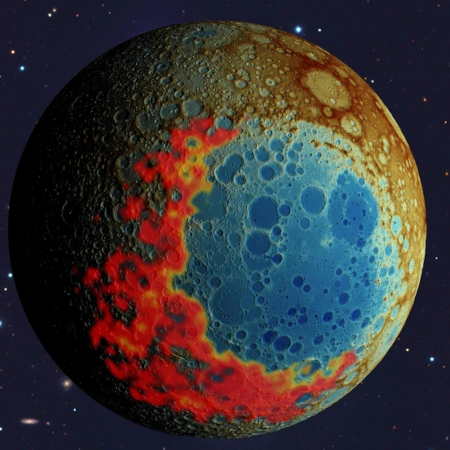New study claims the giant impact that created the Moon’s South Pole-Aitken Basin was oblique, from the south

Click for original. Blue indicates the basin, red
the “thorium-rich and iron-rich ejecta deposit”
While previous work had suggested the giant bolide that had created the Moon’s South Pole-Aitken Basin came in from the north, a new study now proposes that the impact was instead oblique from the south. From the paper’s abstract:
The ancient South Pole–Aitken impact basin provides a key data point for our understanding of the evolution of the Moon, as it formed during the earliest pre-Nectarian epoch of lunar history, excavated more deeply than any other known impact basin, and is found on the lunar far side, about which less is known than the well-explored near side. Here we show that the tapering of the basin outline and the more gradual topographic and crustal thickness transition towards the south support a southward impact trajectory, opposite of that commonly assumed. A broad thorium-rich and iron-rich ejecta deposit southwest of the basin is consistent with partial excavation of late-stage magma ocean liquids.
These observations indicate that thorium-rich magma ocean liquids persisted only beneath the southwestern half of the basin at the time of impact, matching predictions for the transition from a global magma ocean to a local enrichment of potassium, rare-earth elements and phosphorus (KREEP) in the near-side Procellarum KREEP Terrane.
In other words, when this impact occurred, part of the impact site in the south was still a magma ocean.
This result, if confirmed, has research implications for the missions targeting the Moon’s south pole. It suggests the geology will have that KREEP materials readily available, which will provide important information about the Moon’s early geological history.
On Christmas Eve 1968 three Americans became the first humans to visit another world. What they did to celebrate was unexpected and profound, and will be remembered throughout all human history. Genesis: the Story of Apollo 8, Robert Zimmerman's classic history of humanity's first journey to another world, tells that story, and it is now available as both an ebook and an audiobook, both with a foreword by Valerie Anders and a new introduction by Robert Zimmerman.
The print edition can be purchased at Amazon or from any other book seller. If you want an autographed copy the price is $60 for the hardback and $45 for the paperback, plus $8 shipping for each. Go here for purchasing details. The ebook is available everywhere for $5.99 (before discount) at amazon, or direct from my ebook publisher, ebookit. If you buy it from ebookit you don't support the big tech companies and the author gets a bigger cut much sooner.
The audiobook is also available at all these vendors, and is also free with a 30-day trial membership to Audible.
"Not simply about one mission, [Genesis] is also the history of America's quest for the moon... Zimmerman has done a masterful job of tying disparate events together into a solid account of one of America's greatest human triumphs."--San Antonio Express-News

Click for original. Blue indicates the basin, red
the “thorium-rich and iron-rich ejecta deposit”
While previous work had suggested the giant bolide that had created the Moon’s South Pole-Aitken Basin came in from the north, a new study now proposes that the impact was instead oblique from the south. From the paper’s abstract:
The ancient South Pole–Aitken impact basin provides a key data point for our understanding of the evolution of the Moon, as it formed during the earliest pre-Nectarian epoch of lunar history, excavated more deeply than any other known impact basin, and is found on the lunar far side, about which less is known than the well-explored near side. Here we show that the tapering of the basin outline and the more gradual topographic and crustal thickness transition towards the south support a southward impact trajectory, opposite of that commonly assumed. A broad thorium-rich and iron-rich ejecta deposit southwest of the basin is consistent with partial excavation of late-stage magma ocean liquids.
These observations indicate that thorium-rich magma ocean liquids persisted only beneath the southwestern half of the basin at the time of impact, matching predictions for the transition from a global magma ocean to a local enrichment of potassium, rare-earth elements and phosphorus (KREEP) in the near-side Procellarum KREEP Terrane.
In other words, when this impact occurred, part of the impact site in the south was still a magma ocean.
This result, if confirmed, has research implications for the missions targeting the Moon’s south pole. It suggests the geology will have that KREEP materials readily available, which will provide important information about the Moon’s early geological history.
On Christmas Eve 1968 three Americans became the first humans to visit another world. What they did to celebrate was unexpected and profound, and will be remembered throughout all human history. Genesis: the Story of Apollo 8, Robert Zimmerman's classic history of humanity's first journey to another world, tells that story, and it is now available as both an ebook and an audiobook, both with a foreword by Valerie Anders and a new introduction by Robert Zimmerman.
The print edition can be purchased at Amazon or from any other book seller. If you want an autographed copy the price is $60 for the hardback and $45 for the paperback, plus $8 shipping for each. Go here for purchasing details. The ebook is available everywhere for $5.99 (before discount) at amazon, or direct from my ebook publisher, ebookit. If you buy it from ebookit you don't support the big tech companies and the author gets a bigger cut much sooner.
The audiobook is also available at all these vendors, and is also free with a 30-day trial membership to Audible.
"Not simply about one mission, [Genesis] is also the history of America's quest for the moon... Zimmerman has done a masterful job of tying disparate events together into a solid account of one of America's greatest human triumphs."--San Antonio Express-News


On grazing hits:
https://www.secretprojects.co.uk/threads/astronomy-and-planetary-science-thread.36194/page-67#post-839557